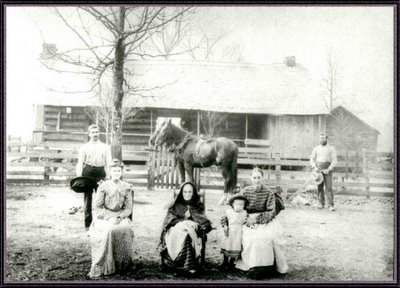Friday, March 03, 2006
Part 7: My American Ancestors, a Thumbnail Sketch

When great-great grandfather Sterling M. was but a few weeks old, piercing the Edgefield nights with his hungry cries (on occasion - surely), the year 1799 rolled over into 1800. The infant nation encamped along the Atlantic seaboard - without benefit of Florida - would shortly wake with its own hungry cries and turn that hunger towards a great western expansion that would catch little Sterling up in its arms and carry him off (eventually) to Kansas. And that would not be the Kansas of Dorothy and Toto. It would be the Kansas of Old John Brown and the bloody Border Wars.
Opening that first decade, new lands were stripped from the southern Indian tribes, offering the lure of settlement on the western frontiers in Kentucky, Tennessee, and points south. President Jefferson stunned the nation when, in 1803, he made the Louisiana Purchase (828,000 square miles). Suddenly there were frontiers beyond the frontiers.
Enos and Nancy M. stayed on in Edgefield and increased their family by children Nancy, born circa 1801, Elizabeth, born circa 1803, and William James, born (by some reports) circa 1806. In 1807 the Edgefield Deed Books record that Enos and Nancy M. sold 100 acres to William Hardy. That is the final record of their presence in South Carolina. They were off for Tennessee!
Before progressing too far, we need to retreat, in both time and distance, to Amherst County, Virginia, in the 1790’s. Here we find the family of Henry and Martha (Goff) McDaniel. Several of their children are already married and have started families of their own. Amongst these is daughter Nancy who married a young Englishman, Timothy Warhurst. The story goes that Timothy Warhurst had been Armour Bearer to King George III, had sailed to the Colony of Virginia with intent to return to England, but missed his departure sailing and decided to stay on in the New World.
One branch of this McDaniel family had already migrated to Edgefield District, South Carolina, where they were very likely well acquainted with the Evan M. family. Another branch had migrated to Chatham County, North Carolina, and would meet the M.‘s "on down the road". In the 1790’s, Henry and Martha McDaniel and several of their children (with their families, including the Warhursts) removed to the Pendleton District, South Carolina….a district some seventy miles to the northwest of Edgefield.
Henry McDaniel died in 1802. His wife Martha died in 1805 and left her property to her two youngest sons, John and Phillip.
The Timothy Warhurst family appears in the 1800 and 1810 census for the Pendleton District. At some point not too long after 1810, the Warhurst family set out for Tennessee(?) / Alabama(?). It is not clear whether Timothy died before they left, or on the journey. It is commonly accepted that he died of drowning …one source claims that he drowned in the Tennessee River – which would have been "on the journey," if true. A descendant who lives in St. Joseph, Missouri, says that the tale told in her family was that "Tim Warhurst got drunk, fell off a boat, and drowned."
NOTE: Availing oneself of strong drink was normal behavior in early America. In "The Reshaping of Everyday Life: 1790-1840," by Jack Larkin (1988), Larkin writes…. "By almost any standard, Americans drank not only near-universally but in enormous quantities. Their yearly consumption at the time of the Revolution has been estimated at the equivalent of three-and-a-half gallons of pure, two-hundred proof alcohol for each person." In the "Botany of Desire," Michael Pollan (2001), Pollan devotes a quarter of his book to John "Johnny Appleseed" Chapman, and writes…. "and hard cider was the fate of most apples grown in America up until Prohibition. Apples were something people drank. The reason people in Brilliant wanted John Chapman to stay and plant a nursery was the same reason he would soon be welcome in every cabin in Ohio: Johnny Appleseed was bring the gift of alcohol to the frontier." There is no need to suspect that the Enos M. family, wending their way towards the Tennessee frontiers, were traveling without a supply of that social necessity - liquor…. while back in Edgefield, a common expense for conducting an estate sale, was the hard drink served round to the potential bidders.
Photo: Ca late 1800's .... some of the Barker cousins gathered around the family matriarch, John Sophina Barker. Why did they name her 'John'? No explanation has ever been offered.